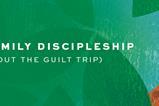Adolescents face huge questions around identity, belonging and purpose and the best answers come from the gospel - Gareth Crispin explains why

For your child to move successfully through adolescence into mature adulthood they have to discover answers to three fundamental questions: Who am I? Where do I belong? And why am I here? Answering these three questions of identity, belonging and purpose will enable your teenager to emerge from the chrysalis and spread their wings.
Let’s look at each in turn and see how the gospel and the church provide the best answers to each one.
Who am I?
Think of a book series or TV/film boxset aimed at teens and emerging adults and odds on there will be an issue with the parents. Parents will either be dead, absent for some other reason, unreliable, or possibly even downright evil. Think of Harry Potter, Alex Rider, Divergent and The Hunger Games – in each case the main character (normally a teen themselves) is pushed out into the world, separate from their parents, to find out who they are - in Harry’s case, it’s being a wizard.
without a successful answer to the identity question young people are more than likely going to suffer from feelings of insecurity and anxiety as they grow
These works of fiction are mirroring reality. At the outset babies literally don’t know they are a different being from their mother and growing up is one long process of what psychologists call individuation – becoming you. This process deepens in adolescence with all the physiological changes going on. None of us ever 100% understand who we are but, generally speaking without a successful answer to the identity question young people are more than likely going to suffer from feelings of insecurity and anxiety as they grow.
In previous generations (including yours) the identity question was less intense. Now adolescents are faced with a plethora of possible identities and ways in which to curate those identities (see here for more on that). The question ‘who are you?’ now reads ‘WHO ARE YOU?!’ It can be like going to a new restaurant and being presented with a menu so large and overwhelming that you freeze, pick nothing and go hungry.
The gospel of course says to adolescents, whatever else you are and however you work this out in your life, you are a dependent creature, made in the image of God, an image that has been marred by sin but made new in Jesus - you are a child of God loved by a loving heavenly father.
Where do I belong?
Part of successfully understanding who they are, adolescents must also discover where they belong. Once Harry Potter finds out that he IS a wizard what does he do? He goes off to be with the other wizards. Even then he has to go through a process to be sorted into a house which is full of others that are not only wizards but are wizards like him. The questions: who am I like and who am I not like are ever present – it is all about the underlying question of belonging.
in essence the church provides the best answer there is to your adolescent’s questions of belonging
Again, if we wind the clock back it wasn’t so complicated. Go back far enough and you were your family and your families trade (just think, people in the UK used to even acquire the name of their trade e.g. Taylor). But now, again the options are myriad. In addition to those available physically, the internet and social media allows young people to explore a vast array of possible communities to be a part of online. These communities however are inherently unstable. Young people might be part of a sports community but what then happens when you are injured? They might be part of a political movement but what happens when the cultural winds change? They might be a part of any group/community but in a world where identity is seen as fundamentally fluid so to are the communities they build.
This is another reason why gospel is good news. The church is a place of belonging like no other. Yes some people have sabotaged the work of the church through abusive leadership and relationships but in essence the church provides the best answer there is to your adolescent’s questions of belonging. As part of the body of Christ each person is valued and needed for who they are, in fact the body needs them to be them. Often the message teens receive is all about how the church wants them to change, and some of that is right and proper of course, but fundamentally we need them as them.
Why am I here?
In a book of questions that children ask, the atheist philosopher A C Grayling answers the question: ‘what are humans for?’ with the concise answer: ‘nothing.’ He expands on that but in essence that is his answer and adolescents get what he means. In perhaps the hardest of the three questions to tackle, todays teens understand the dilemma. They want to discover a real purpose, something worth living and dying for, but if you’re just constructing that yourself and it doesn’t have any real foundation then it isn’t a real purpose – it’s simply a mirage.
Read more:
4 takeaways for Christian parents from David Attenborough’s new BBC animal documentary: Parenthood
Christian parents can usefully use KPop Demon Hunters to explore themes of idolatry and the Kingdom of God with their family
Harry Potter is the only one who can take down Voldemort and other teen characters have similar missions in life. That’s all fine and well in fiction but most teens feel the gulf between fantasy and fact and they feel it really powerfully.
The gospel and the church of course provide the very best answer to this biggest of questions. We are here to glorify God in all things (1 Corinthians 10:31) and in that process we are made to be satisfied in him (Psalm 37:4). Our celebrity culture does a great job of showing our young people that if you seek happiness for itself you will not find it; the things of this world are not made to meet our deepest longings but God is.
So then ask questions…
As young people these three big questions you can help them find good answers in the gospel and the church by asking some other questions yourself. Try asking them what they think other people base their identity on? How stable is that as a foundation? Or ask them about purpose: without God how can anyone judge between good and bad purposes (who decides?) and why is it when people can’t reliably say what a good purpose is they still seek it all the same? These and similar questions will help your adolescent see the bankruptcy of life without God and by default will encourage them to seek answers where they will find them best.


































